Verdi: La Traviata: Premium Edition (Rizzi)
Introduction
When the opera world `discovers` two singers with the attraction of Anna Netrebko and Rolando Villazón the media circus goes into overdrive and, as in Salzburg for this production, the rich and famous clamoured to dress up and be seen in the vicinity of the Festspielhaus. Also, when a prestigious recording company such as Deutsche Gramophon insists on recording all performances (not sure they did this for the DVD production, but almost certainly did for the CD set which has already been released), you know that things are getting serious.
This is the filmed recording of one of those nights in August, 2005.
The story is as follows (again, the synopsis ia unashamedly stolen from my review of another version of this opera)
Violetta Valéry (a courtesan) is throwing yet another party despite having been seriously ill - most likely due to the hedonistic lifestyle she enjoys. She is introduced to Alfredo Germont, and is told that he visited her throughout her illness. Violetta feels unsteady, and the two find themselves together, away from the main party, with Alfredo looking after her. He warns Violetta that her lifestyle is killing her, and declares his love for her. She insists that she doesn`t know how to love, and hands Alfredo a flower. He leaves, and after some reflection on what he said, dismisses all thoughts of settling down - despite hearing Alfredo`s voice again. She`s just not that sort of girl.
She is, of course, just that sort of girl, and the story continues three months into their relationship. Violetta is selling all her posessions to help keep Alfredo and herself in some modicum of comfort, but she is becoming more desperate. Alfredo goes off to try and raise some money himself. Alfredo`s father turns up and tried to persuade Violetta to leave his son, as their relationship is ruining the Germont family reputation. She tells him of her illness and how she relies upon his son but Germont Snr. doesn`t care. Violetta reluctantly agrees to leave, but in return for Alredo being told the real reason she left, but only after she is dead.
Halfway through writing a note to Alfredo, he returns. She is very distressed and runs off, but Alfredo reads the unfinished note, and sees a party invitation to Violetta from her friend Flora, gets the wrong message, and swears revenge.
Flora`s party is in full swing when Alfredo arrives. He pretends not to notice Violetta, and starts gambling recklessly, although is quite successful in winning lots of money from very influential, and subsequently highly annoyed people.
Alfredo begs Violetta to return, but she is sticking to her promise to his father and refuses, saying she is now in love with the Baron (who has just lost all his money to Alfredo). Alfredo flings his winnings at her, making sure he tells everyone that he has repaid eveything he owes. Not a good move, as his father has joined the party and promptly renounces his son. Violetta is even more distressed (if that`s possible) and the Baron is intent on revenge
A month later, Violetta is close to death and being looked after by her maid, Annina. She tells Annina to take half the money she has left and give it to the poor during the carnival taking place outside. Violetta then reads a letter from Germont Snr. Saying that Alfredo seriously wounded the Baron in a duel and escaped the country but finally learned of Violetta`s sacrifice. He`s on his way to see her and ask for her forgiveness.
Violetta, however, knows that she hasn`t got long to go, but when Alfredo appears, she allows herself to believe they can still have a life together. Alfredo`s father appears and finally accepts Violetta as his own daughter, before she seems to perk up rather dramatically, only to drop dead.
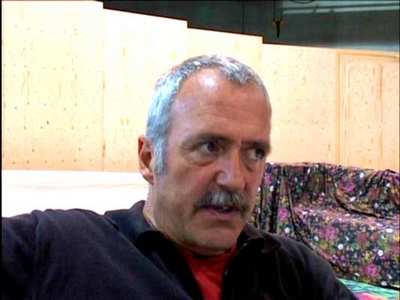
Video
Region-free NTSC 16:9 anamorphic, and the quality is almost perfect in every way. The only irritation comes from the corrugated effect of the surrounding curved wall on the stage, as this creates some blurring around the characters when the cameras follow the singers in close-up.
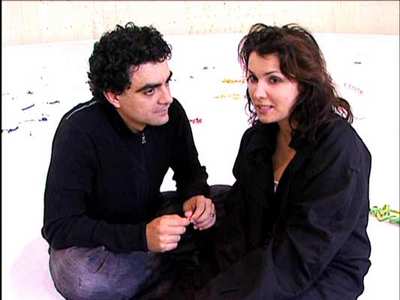
Audio
PCM Stereo or DTS. Both are fine, although the DTS option makes everything sound a little too over-produced. The balance between the orchestra (positioned fairly high compared to the stage level) and the singers is generally marvellous, but I got the feeling there may have been some less-than-subtle tweaking of sound levels from time to time. More on that later.
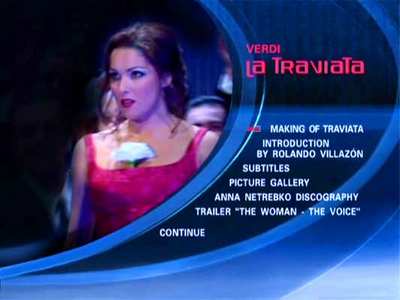
Features
This production comes in two versions, this being the `Premium` edition, and so is packaged as 2 discs, the second being for various extras.
The main extra is a 40 minute backstage `documentary` which shows a large chunk of rehearsals, but mainly concentrates on the general loveliness of Netrebko, and Villazón playing up to the cameras. We do however learn some interesting titbits about how to sing in Italian from the coductor, Carlo Rizzi, and that the director and producer rarely stay around for the first night. I`m not sure this will be watched more than once.
Other extras include a very well done introduction to the story from Villazón (in German), and a badly edited tralier for another DG /Anna Netrebko offering, `Anna Netrebko - The Woman, The Voice` (which appears to be an `Aria` satyle film, but with just the one singer and one director)
Subtitles are provided in 6 languages, and the accompanying booklet tells you little about the opera itself, but has a two page spiel quoting some rave reviews for this production.
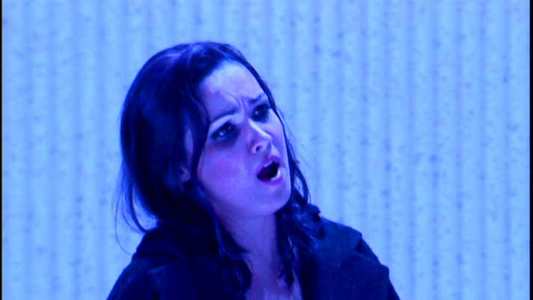
Conclusion
After all the pre-publicity, was it worth it?
Willy Decker`s production is nicely thought out. He cuts down stage clutter, leaving us with various sofas and an ominous clock (no prizes for guessing what this symbolises). A few oddities irritated me slightly, such as Alfredo`s appearance at the end of Act I when I was positive his voice should have been heard in the distance.
Decker emphasises Violetta`s central role by introducing her right at the beginning of the overture, approaching the aforementioned clock which appears to be operated by a death-like figure (who becomes the doctor in Act III - though I was a little confused about who was playing / singing this role).
We also have a striking red dress, which stands out in the deliberately colourless staging, and although this is hardly a new theatrical symbol, Decker uses it to devastating effect here. As the opera progresses, Violetta wears it less and less, showing her life ebbing away, while in the end, it is worn by some ghostly reflection of herself, who is carried off the stage on the clock just before the end. All very obvious, but incredibly powerful imagery.
The chorus is completely male (in costume at least) which gives the various parties a very oppressive and sinister undertone. It`s a good, large chorus as well, which I like to see.
And so we come to the performances.
There is nothing worse than over-hyped `opera` singers who have never sung an opera in their lives, but equally, there is nothing better than to experience the sort of dedicated and intense music-making on this DVD.
Netrebko is quite lovely - in voice, as well as looks. Ok, I know that much of the publicity surrounding her takes into account the fact that she is one of the most gorgeous people on the planet, and I should perhaps concentrate a litt more on the music, but sometimes it`s very difficult to do. When on stage, her presence demands attention, and she sings throughout with passion, and more importantly, accuracy. The range of dynamics this woman can produce while keeping the intensity is incredible, and her acting can`t be faulted. If there is anything I would compain about (again) it is what seems to be the constant sound-level changes which make things appear a lot more forced than they are - from all concerned, and even some heavy breaths are a lot more noticeable than they should have been.
Simlilary, Villazón is highly impressive. He is well-suited to this type of Verdian tenor role, as he proved in Don Carlo (also reviewed here). I fine it very refreshing to see someone actually opening their mouth when belting out a good tune as well. He does however tend to belt out a little too much perhaps, which leaves you thinking a a bit of subtlety here or there wouldn`t go amiss, but overall I enjoyed his performance immensely.
Thomas Hampson (Germont Snr.) seems far too young for the role, but sings it well enough. He hasn`t however got the stage presence of Renato Bruson in the same role on the Opus Arte DVD, and appears quite a seedy character overall.
The general pace of the opera is judged well by Rizzi in the pit, but the orchestra sound, although very well played, is messed-up by the engineers. There are moments when exactly the same written dynamic appears to change dramatically (just to get the balance between stage and pit), and different orchestra sections are brought quite unsubtly to the fore for a few seconds before being `taken away` again. When the sound is left alone though, we do get the sense that it`s really the Vienna Phil in the pit, which I quite enjoyed, but perhaps everything is a little too refined.
One big disappointment comes right at the end, when we are taken backstage during the curtain-calls. What`s the point of that? I can only assume Brian Large had to pop out for a few seconds, leaving the video direction to an assistant, The continuation of the media `love affair` with the two stars showed lots of hugs, kisses and high fives before running back on to bask in the applause of their adoring public (which consisted of some very well-off and expensively dressed Austrians - just the sort of image which doesn`t negatively stereotype the medium at all!) .
There are at least ten versions of this opera out on DVD at the moment, and so any newcomer is going to have tomake quite an entrance. DG are playing on the Netrebko- Villazón effect, and not being quiet about the fact that there are other lavish Netrebko/DG productions out there, with some Villazón/DG productions on the cards in the future.
If you were to go for this performance, which I would certainly recommend (although not over all others), get the single disk version. The `Premium` edition is nice enough, but the second disk adds up to not much more than DG self-promotion.
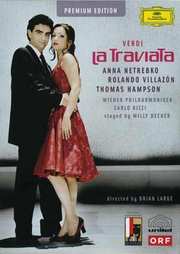
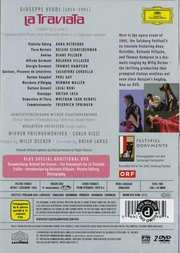




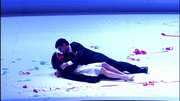
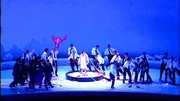
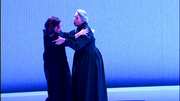
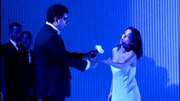



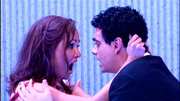

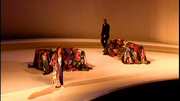



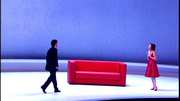
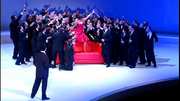
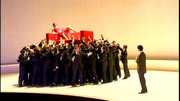
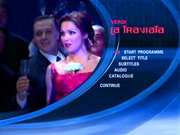






























Your Opinions and Comments
Be the first to post a comment!